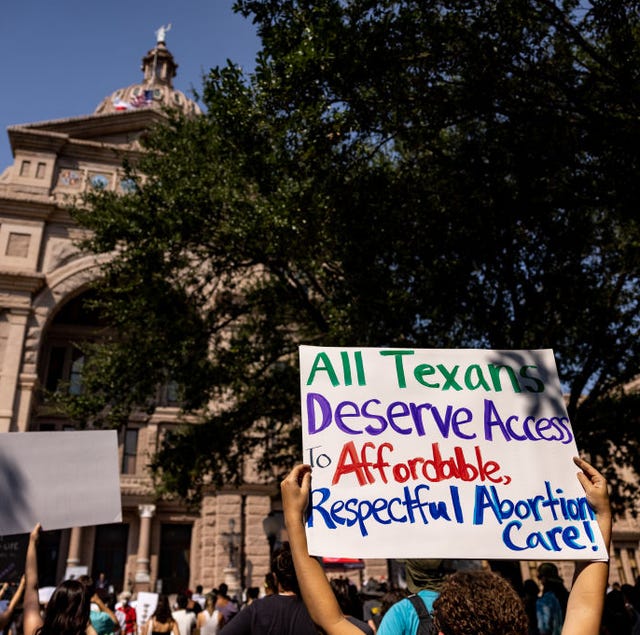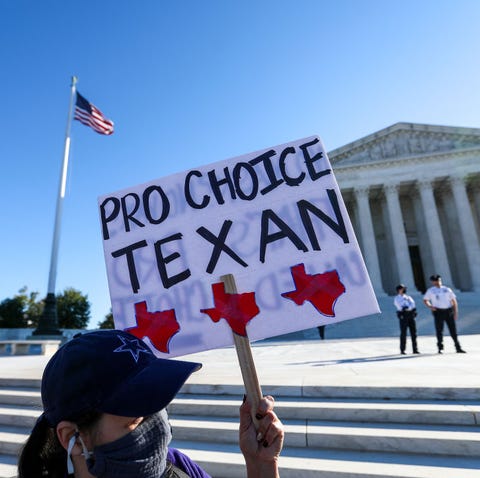Products You May Like

Jordan VonderhaarGetty Images
It’s been nearly seven months since Texas’ extreme abortion ban went into effect, leaving patients and abortion care workers across the nation scrambling to deal with the ramifications. The law, S.B. 8, bans most abortions at around six weeks of pregnancy, before most people even know they’re pregnant, and awards $10,000 or more to any private individual who successfully sues someone who “aids or abets” an abortion after that time.
Because abortion is so common—nearly 1 in 4 women will get one in their lifetimes—Texas patients have been forced to travel to other states to access care. According to new Planned Parenthood data shared exclusively with ELLE.com, from when S.B. 8 went into effect in Sept. 2021 to Jan. 2022, patients with a Texas zip code who sought care at Planned Parenthood centers in surrounding states traveled seven times further compared to other patients who received abortion care from those same centers during that time. Per Planned Parenthood, this is the first time the organization is releasing data on the average distance Texas patients have traveled since S.B. 8 has been in place.
The number of patients with a Texas zip code who sought care from Planned Parenthood centers in nearby states has also been increasing an average of six percent per month, illustrating a recent domino effect of more and more patients seeking care outside of Texas. When comparing just January 2022 to December 2021, Planned Parenthood centers in surrounding states saw a 39 percent increase in the number of patients with a Texas zip code seeking abortion care. Comparing year over year, or January 2022 to January 2021, there was a staggering 918 percent increase. And because this data only represents people going to Planned Parenthood centers, it doesn’t account for additional patients who may have traveled to get care from other providers.
“For over 200 days, this law has had a devastating ripple effect across the country, creating unnecessary hurdles for patients to get health care that should be available to them in their own community, or at the very least, their state,” Alexis McGill Johnson, president and CEO of Planned Parenthood Federation of America, told ELLE.com in a statement. “And we know that there are people who these data do not reflect—those who are being forced to remain pregnant or seek care outside of the health care system.”
Traveling out of state not only puts an additional burden on patients—who might have to take off of work, raise funds, or secure child care in order to access an abortion—but some of these surrounding states could also soon disappear as access points. “The impact on patients is as unconscionable as it is unsustainable, and unfortunately, this is just the start,” McGill Johnson continued. “With the Supreme Court all but greenlighting Texas’s abortion ban, anti-abortion politicians in other states have been emboldened to pass similarly draconian legislation without a care or concern for the people at the other end of these horrendous policies.”
For example, in Oklahoma, the recent data from Planned Parenthood shows that between September 2021 and January 2022, patients with a Texas zip code made up almost 60 percent of abortions provided at Planned Parenthood centers. During that same time period the year prior, only about 10 percent of patients had a Texas zip code. But just this month, the Oklahoma Senate approved a bill, similar to the Texas law, that would ban most abortions after about six weeks and allow private individuals to sue anyone who “aids or abets” a person getting an abortion after that time, per The Oklahoman. The bill is expected to pass in the state House and be signed into law by Republican Gov. Kevin Stitt.
“This isn’t healthy for patients,” Dr. Iman Alsaden, the medical director of Planned Parenthood Great Plains, which services Arkansas, Kansas, Oklahoma, and western Missouri, said in a statement to ELLE.com. “And it’s not sustainable for the health center staff who are burnt out from doing everything they can to meet each patient’s needs.” According to Alsaden, there’s already a bottleneck in Oklahoma due to the influx of Texas patients, meaning care providers have been forced to turn people away or schedule them weeks out, pushing patients further into pregnancy and potentially affecting the type of care they can receive.
“S.B. 8 has forced Texans to travel extraordinary distances to access constitutionally protected abortion care—and that’s only the people who are able to do so,” Alsaden said. “As a provider in surrounding states, I see the dramatic and consequential impact this law has on Texans every day. People are crossing state lines, at times traveling for hundreds of miles, seeking abortion—it’s remarkable what we’ve normalized in order to get essential health care in this country.”
This content is created and maintained by a third party, and imported onto this page to help users provide their email addresses. You may be able to find more information about this and similar content at piano.io

